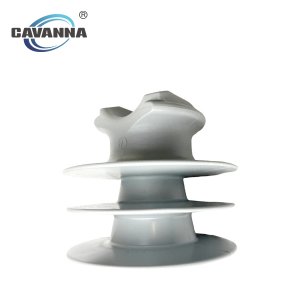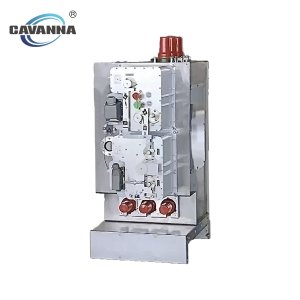| Type | Rated voltage (KV) | Specified bending load (kN) | Structure length (mm) | Min Arc distance (mm) | Leakage distance (mm) | Lightning impulse withstand BIL(KV) | Power frequency withstand (wet) (KV) |
FPQ-11/4 | 11 | 4 | 285 | 205 | 450 | 105 | 45 |
| FPQ-11/5 | 11 | 5 | 300 | 220 | 480 | 105 | 45 |
| FPQ-11/5 | 11 | 5 | 245 | 177 | 426 | 105 | 45 |
| FPQ-11/10 | 11 | 10 | 276 | 191 | 525 | 105 | 45 |
FPQ-15/10 | 15 | 10 | 280 | 160 | 660 | 145 | 65 |
FPQ-24/8 | 24 | 8 | 260 | 180 | 770 | 185 | 80 |
| FPQ-33/10 | 33 | 10 | 335 | 250 | 740 | 185 | 80 |
FPQ-33/6 | 33 | 6 | 490 | 380 | 880 | 200 | 95 |
FPQ-35/5 | 35 | 5 | 540 | 375 | 1185 | 230 | 95 |
| FPQ-36/12.5 | 36 | 12.5 | 600 | 530 | 1440 | 325 | 140 |
Description
Composite insulators are generally produced by preparing the screens individually and then fitting the required number of them onto a shank coated with extrudate and vulcanizing them with the coat, or by centrally placing a rod with a predetermined number of screens in a two-part mould and injecting all the screens at once.
Composite insulators for high-tension use must conform to specific electrical requirements. The carrier rod must be electrically insulating in its axial direction and the insulating layer must be secured thereto in a manner that no electrical conduction can occur at the seam between the insulating cover and the interior carrier rod. The insulating cover performs several functions including providing resistance to weathering, UV, ozone, etcetera. The cover is also required to have good mechanical resistance to cold and good electrical tracking resistance. Desirably the insulating cover should be flexible, halogen-free and flame retardant.
High voltage composite insulators include long rod suspension composite insulator, pin type composite insulator, composite cross-arm insulator, composite post insulator, composite bushing, and composite insulator for electric railways.
For shed and housing moulding, international advanced method of whole moulding and whole injection are adopted. The connection zone between the core and end fitting is compressed with crimping machine. The products have the characteristic of artistic looking, small volume, light weight, uneasy broken, high bending and torsion strength, good anti-explosive performance, easy transportation and installation. To ensure safe operation, un-puncture design is adopted. Reliable structure is applied to make the core safe and reinforce the mechanical strength. Composite insulators are especially suitable to high polluted areas together with advantages of high mechanical tensile load, long life span and compact size.
Composite insulators are suitable for overhead line electrical insulation of suspension or tension. They have good mechanical property, high tensile strength, invulnerability, and easy for installation.
Application
As an alternative to ceramics, composite materials were developed for use in insulators for transmission systems. Such composite insulators are also referred to as non-ceramic insulators (NCI) or polymer insulators, and usually employ insulator housings made of materials such as ethylene propylene rubber (EPR), polytetro fluoro ethylene (PTFE), silicone rubber, or other similar materials.
Compared with the conventional insulators manufactured homogeneously from the material ceramic or glass, composite insulators consist of two components of different materials.
A number of composite insulators made from lighter weight polymeric materials have been developed for use in such high voltage installations. Such composite insulators generally include a fiberglass rod having a number of weather sheds constructed of a highly insulating polymeric material attached to the rod along its length. Composite insulators including shield layers of a synthetic material are given preference mainly because the shield layer of a synthetic material, particularly silicone, is hydrophobic, i.e. the insulators employed mostly outdoors are highly water repellant which is conducive to repelling dirt and thus to low leakage current losses. And also, this is a lightweight structure which facilitates assembly.
Specifications






